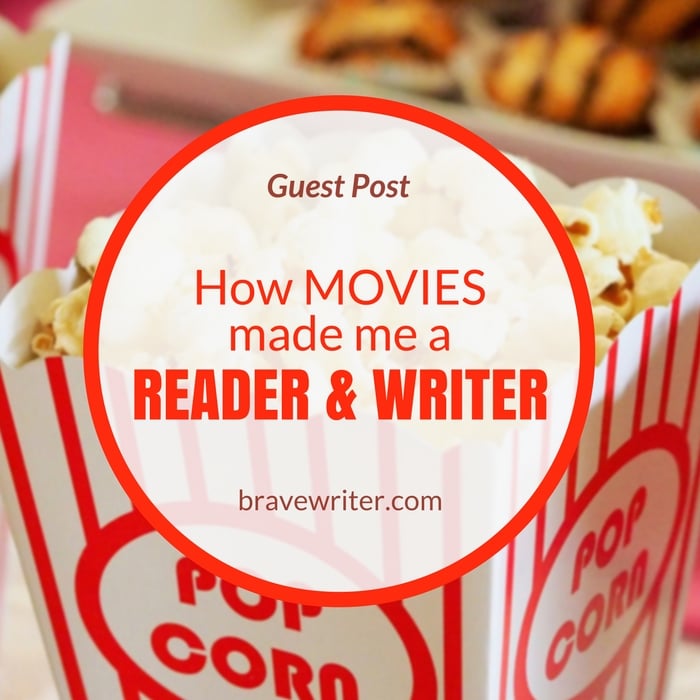How Movies Made Me a Reader and Writer

By Brave Writer Alum Amy Frantz
I would often hear, either in the homes of family members or in the aisles of stores, a parent telling their child, “You have to read the book first,” when the child asked for a movie. I heard this all through my childhood outside of our home and it never made sense to me.
Movies made me a reader and a writer.
Allow me to explain:
I am severely dyslexic. By the age of eleven, I still could not read well. In fact, I didn’t start reading well until my teens. Reading is physically painful for me, but I did it and do it for long chunks of time a day anyway. Reading is vitally important to me, but for a large part of my childhood and adolescence I couldn’t read or couldn’t read well.
So, I watched movies and TV shows instead. I first travelled to Narnia through the television and the BBC’s excellent Chronicles of Narnia adaptations. I met Harry Potter and journeyed to Hogwarts through the cinema, not through the written word. I had adventures with Peter Rabbit through animation. Film and television ignited my love of stories, a love which has lasted my entire life.
I was quite lucky to be raised outside the school system by a homeschooling mother who was calmly undismayed by my difficulty reading. My mom steadfastly believed that I would get there in my own time, in my own way. And I did.
I was raised in a language rich environment. My mom read to my brothers and me daily. For long car rides, we had audio books. Mom would take us to the library and I would go to the kid’s section and take a seat beside the Beatrix Potter books. I couldn’t read them, but I liked to be near her words. I would flip through the books, looking at the illustrations, and running my fingers over her words. I checked out books I couldn’t really read ‘cause I wanted to take the words with me and I was allowed to do that.
But more than all this, my parents allowed me to have access to adaptations of books. No one insisted that I “read the book first.” I was allowed to check out the BBC Chronicles of Narnia from the library as many times as I wanted. I’m sure I watched the first Harry Potter movie until my entire family was sick of it.
I loved these stories so much and I loved words even if their written form was a tricky foreign country with unreadable road signs. Because I loved stories so much, I wanted access to their source material.
Movies and television not only made me want to read books,
but they made the reading easier.
When I begged my mom to let me have the first Harry Potter novel, it was a struggle for me to read it at the age of eleven. But because I already knew the basic story, because I knew how most of the pieces fit, if I had to skip sections or couldn’t understand large swaths of paragraphs, that was okay because I wouldn’t get lost.
Adaptations gave me a road map for this strange land of written words that can still be difficult for me to navigate even today. If I don’t concentrate, the words will fracture and all their meaning will run right off the page. Movies and television helped me to put the meaning back when I was still struggling so hard to read.
I honestly don’t know how my development would have gone if I had been raised in an environment that limited my access to stories. I might not enjoy reading now and I probably wouldn’t be a writer.
When I was young, my parents gave me a bulky red tape recorder that I could carry around with me, and I told my stories into that because I couldn’t yet write. It was counted as writing even though there wasn’t a pen in my hand.
My mom accommodated my learning disability. While she still diligently worked with me at handwriting and phonics, undeterred by my seeming lack of much progress, she also gave me access to the forms of language and expression that were easiest for me, instead of insisting I restrict myself to the forms which were painful, difficult, and limiting.
Developing reading and writing skills in children don’t always look like a child sitting with a book open in their hands or physically putting a pen to paper. Sometimes a child developing reading and writing skills looks like watching Harry Potter for the thousandth time or speaking into a recording device. I think it’s important to give kids access to stories and language in the ways that are easiest for them. While still teaching the ‘hard’ stuff, sure, but not letting the hard stuff dominate the child’s linguistic landscape.
I grew up with fantastical stories and words, so many words, running through my head. I grew up with Narnia and Hogwarts and Wonderland, Winnie-the-Pooh and Shakespeare, and so many more. I had a childhood rich in language, but it oftentimes might have looked to an outsider like a kid “just watching television.”
I put forth for your consideration that a child who wants to watch the same Disney film for the third time this week is a child who wants to actively engage with a story and with words spoken and sung. That’s a child loving a story just as much as the child curled up on the couch with a book. And sometimes kids need to come at stories through a screen before they can pick up the book. If a child loves stories, they will probably want to pick up the book when it’s right for them, and that’s the most important thing.


















